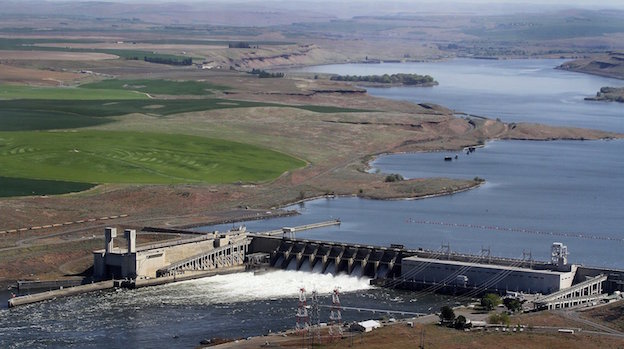forum
library
tutorial
contact

The Future of Columbia-Snake River
Hydro Operations?
by Columbia-Snake River Irrigators Association
Capital Press, March 31, 2021
|
the film forum library tutorial contact |

|
The Future of Columbia-Snake River
by Columbia-Snake River Irrigators Association
|
Does Congress or the federal judiciary have the power to authorize dam breaching decision?
 Over the past 30 years, the Columbia-Snake River Irrigators Association (CSRIA) has steadfastly defended the Lower Columbia-Snake River hydro projects. The CSRIA believes to this day that these projects contribute substantially to the economic vitality of the region. But formidable parties to the Lower Snake River Dam operations seek to "breach" the dams, including EarthJustice, the state of Oregon, several Tribal interests, a multitude of environmental groups, and even some municipal and elected representatives.
Over the past 30 years, the Columbia-Snake River Irrigators Association (CSRIA) has steadfastly defended the Lower Columbia-Snake River hydro projects. The CSRIA believes to this day that these projects contribute substantially to the economic vitality of the region. But formidable parties to the Lower Snake River Dam operations seek to "breach" the dams, including EarthJustice, the state of Oregon, several Tribal interests, a multitude of environmental groups, and even some municipal and elected representatives.
What is now happening? What about the federal hydro agencies' "new" environmental impact statement (EIS) and biological opinion (BiOp)?
Following a successive string of court victories, EarthJustice, Oregon, and others have challenged the new EIS "preferred alternative," because it did not include dam breaching/drawdowns, perceived as optimizing fish survival requirements. The environmental groups stress that the EIS evaluations did acknowledge that dam breaching would likely lead to higher fish survival, but the hydro agencies determined that the economic costs to the power, navigation and irrigation sectors were unacceptable. The court will review EarthJustice's claim, and injunctive relief motion, in the next few months.
Does Congress or the federal judiciary have the power to authorize dam breaching decision? The U.S. District Courts have ruled that they have extensive powers to order agencies to "rebalance" the purposes of the federal hydro projects -- both on the Columbia River system and elsewhere. In effect, the courts hold that they have the (congressionally authorized) rebalancing authority under the Northwest Power Act ("equitable treatment" for power and fish), per the ESA mandates, and perhaps even under new applications of the Clean Water Act. Under existing court approved BiOps, the hydro system has already relinquished about 1,200 MWs of firm power.
It is a small reach for the Court to order further "rebalancing" operations. CSRIA has grimly concluded that U.S. District (Oregon) Court Judge Michael Simon will rule against the hydro agencies EIS-BiOp, and give EarthJustice Court-ordered relief; likely to include a Lower Snake River dam breaching plan, with a court-appointed river master to ensure oversight. Injunctive relief motions will be filed in July 2021.
(bluefish notes: Congress may pass a "joint resolution" disapprove of a Deauthorization List received from the US Army Corp of Engineers: Section 1301 of America's Water Infrastructure Act of 2018 )What can CSRIA do to confront the future?
Against this backdrop, U.S. Rep. (Idaho) Mike Simpson has released a very far-reaching dam breaching "mitigation plan," allocating about $34 billion to many affected (or potentially impacted) parties. For the irrigators, water rights are protected, but about 91,000 acres would experience severe pumping problems requiring major retrofits. Rep. Simpson views court directives as being inescapable; Govs. Jay Inslee and Kate Brown, regional Tribes, and others, support this mitigation review.
CSRIA must engage prudently and realistically in this process -- not being directly involved is a reckless proposition. The CSRIA must ensure that its members' businesses and livelihoods, and related community economic support services, are well represented in the mitigation discussion. As well, CSRIA concurs with Gov. Inslee's Office that diverse Lower Snake River project operations should receive full review.
learn more on topics covered in the film
see the video
read the script
learn the songs
discussion forum
